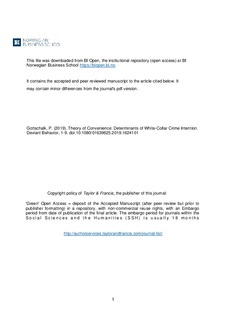Theory of convenience: Determinants of white-collar crime intention
Journal article, Peer reviewed
Accepted version
Permanent lenke
http://hdl.handle.net/11250/2607606Utgivelsesdato
2019Metadata
Vis full innførselSamlinger
- Publikasjoner fra CRIStin - BI [1015]
- Scientific articles [2181]
Sammendrag
Crime intentions are an important area of research in criminology. Yet substitutes for real intentions have to be applied since respondents will be reluctant to tell truthfully of their tendency to commit a crime. In this article, we present determinants of white-collar crime based on the theory of convenience. Convenience theory suggests that the extent of individual convenience orientation determines to what extent a person of respectability and high social status in the course of his or her occupation will make a decision to violate the law whenever alternative decisions are less convenient. A more stressful and greedy financial motive, an improved organizational opportunity to commit and conceal crime, and a stronger personal willingness for deviant behavior are assumed to influence the extent of white-collar crime intention. Based on a survey of business school students, we find support for suggested causal relationships in the theory of convenience. Business school students are relevant for this research, as they will occupy positions in the future where they can commit financial crime, prevent crime, or become victims of such crime.
